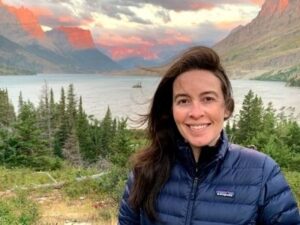Jennifer Raynor is assistant professor of economics at Wesleyan. Her research focuses on natural resource management, with an emphasis on measuring the unintended consequences of rules and regulations. In fall 2021, she is teaching ECON210/Climate Change Econ and Policy. She joined the faculty of the COE in spring 2021.
You are assistant professor of economics at Wesleyan. What sparked your interest in the environment?
I lived in a place and time where kids were sent outside unattended from the morning until the street lights came on at night, and I spent almost all of that time in the dirt or up a tree. I was born a naturalist and especially loved collecting autumn leaves and observing animals of all types. Insects snakes, and turtles were my favorite, but anything that allowed me close enough was fair game. I am still happiest when I am outside and spend most of my free time backpacking, paddling, and snowboarding.
Tell us about your Think Tank project and how it fits in with this year’s overall Think Tank theme of visualizing environmental change.
I will be using satellites to identify fishing activity otherwise would be invisible to regulators and fishery managers. My research will help to illuminate the pressure that IUU fishing places on ecosystems and, by extension, the environmental changes this pressure causes.
 How did you get interested in IUU fishing and “dark fleets,” in particular? What was the impetus for this project, specifically?
How did you get interested in IUU fishing and “dark fleets,” in particular? What was the impetus for this project, specifically?
My former job was at the National Marine Fisheries Service, Pacific Islands Fisheries Science Center. This federal agency is responsible for conducting research and monitoring that supports sustainable management of living marine resources across the Pacific Islands. My research there focused on the economic drivers of behavior, which sometimes lead to unintended consequences of policies. Examining the extent of IUU fishing is an extension of this research agenda.
Why is this topic important, in your opinion?
IUU fishing threatens efforts toward sustainable fisheries management. It also jeopardizes the livelihoods of legitimate fishers and coastal communities by diverting $10 billion to $23.5 billion dollars in fishing revenues annually. IUU fishing has also been connected to transnational crimes, including slave labor, piracy, and arms, drug, and human trafficking. As a result, countries have made it a priority to stop IUU fishing; however, most IUU fishing is difficult to monitor and enforce because it is conducted by “dark fleets”—those that do not appear in monitoring systems. The expansion of high-frequency, high-resolution satellites offers an opportunity to monitor previously invisible fishing activity and direct enforcement activities to the areas with highest risk and need.
 Why did you decide to use satellite imagery to detect illegal and small-scale fishing? Have you used such imagery before, in other research? Satellites are being used to detect all kinds of previously invisible effects of humans on the environment, such as climate change and deforestation. Satellite data is becoming more important for tracking fishing, but previous work only illuminates large vessels. With newer satellites, we think we’ll be able to see even small-scale fisheries, which are significant among island nations. I have used satellite data to quantify environmental conditions in other projects, but I have never used them in this way.
Why did you decide to use satellite imagery to detect illegal and small-scale fishing? Have you used such imagery before, in other research? Satellites are being used to detect all kinds of previously invisible effects of humans on the environment, such as climate change and deforestation. Satellite data is becoming more important for tracking fishing, but previous work only illuminates large vessels. With newer satellites, we think we’ll be able to see even small-scale fisheries, which are significant among island nations. I have used satellite data to quantify environmental conditions in other projects, but I have never used them in this way.
Why did you want to be a member of the Think Tank?
The Think Tank will provide me an opportunity to focus closely on an issue that matters both to me personally and to the world. It also will allow me to engage with scholars and students in related fields that otherwise would be outside my network. Finally, I’m excited for the opportunity to show students that economics isn’t just the source of many environmental problems — it is also the solution!
What do you hope to learn from your fellow fellows?
In my mind, inter-disciplinary research is the best way to reach the “truth” in science. Each field challenges the assumptions of the other, and these new perspectives lead to more nuanced models and interpretation of results. I can’t wait to get critical feedback on the gaps that I know exist and those I haven’t even considered!
Read more about our current and past Think Tank themes and fellows!
